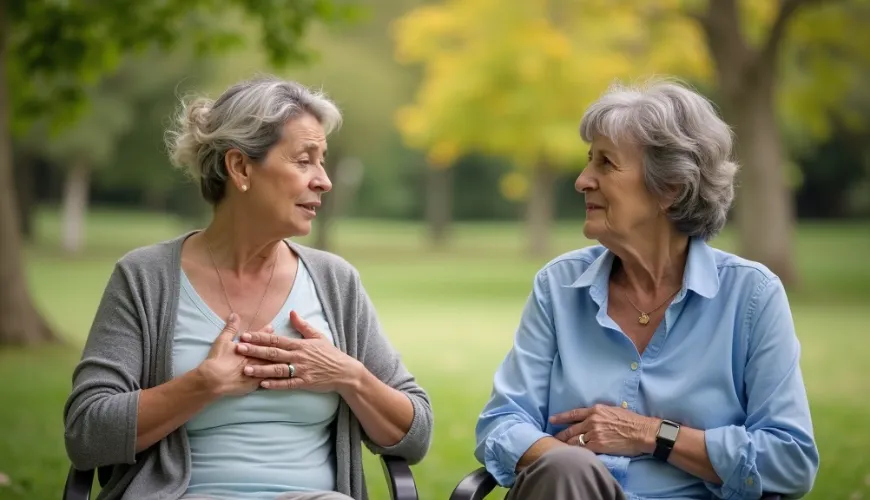
Symptoms of a Ruptured Cyst: What You Can Observe and How to Respond

What Does a Ruptured Cyst Mean and How to Recognize It? Symptoms You Shouldn't Ignore
The idea of a cyst "bursting" somewhere in the body can sound frightening. In reality, however, it is a fairly common occurrence—especially among women of reproductive age. Although most cysts resolve without problems, some can cause acute issues. How to recognize the symptoms of a ruptured cyst, when to take action, and what helps in prevention?
What Exactly is a Cyst?
A cyst is a fluid-filled cavity that can form almost anywhere in the body. Most commonly, people talk about ovarian cysts, which are cysts on the ovaries. These often form as a natural part of the menstrual cycle—for example, as follicular cysts when an egg does not leave the follicle and remains inside.
In most cases, such a cyst disappears on its own, and the woman is unaware of it. However, if a cyst grows to a larger size or bursts at an inconvenient time, it can cause sudden pain, bleeding, and other complications.
When a Cyst Bursts - What Are the Symptoms?
The manifestations of a ruptured cyst can vary—from almost imperceptible to an acute condition requiring medical intervention. It depends on the size of the cyst, its location, and how much fluid or blood enters the abdominal cavity after it bursts.
When an ovarian cyst bursts, it can be quite an unpleasant and sometimes very painful experience, manifesting in several ways. You often recognize it by suddenly experiencing pain in the lower abdomen—the pain can be really sharp, stabbing, and tends to be localized more on one side, either left or right, depending on where the cyst was.
Sometimes a bit of physical activity, such as exercise, an intense walk, or even sex, is enough for the pain to fully manifest. Some describe it as a sudden pressure or an unpleasant feeling that something is "happening" in the abdomen—a peculiar feeling of pressure in the abdominal or pelvic area. Unexpected bleeding that doesn't fit into the regular menstrual cycle can also be a warning sign. And when it's more serious, the body signals in other ways—the person may start to feel nausea, vomiting, or a sensation like they are about to faint at any moment.
In the worst cases, when the cyst causes a significant loss of blood, it can lead to dizziness or collapse. Every organism reacts a little differently, but any similar mix of these symptoms should definitely not be overlooked.
For some women, the pain may be short-lived and subside within a few hours. However, if the pain is accompanied by significant bleeding, fever, or symptoms of shock (rapid heartbeat, cold sweat, loss of consciousness), it is imperative to seek medical help immediately.
Distinguishing a Ruptured Cyst from Other Issues is Not Easy
Pain in the lower abdomen can have numerous other causes—from appendicitis, ectopic pregnancy, to urinary tract infections or pelvic inflammatory disease. That's why it's so important not to ignore severe pain. A doctor can use ultrasound or blood tests to determine if a cyst has ruptured and whether further intervention is needed.
For instance, 29-year-old Petra noticed a sudden sharp pain in her right lower abdomen during a regular day. At first, she attributed it to ovulation, but the pain did not subside and gradually worsened. When weakness and nausea were added, she ended up in the emergency room. It turned out that a larger follicular cyst had ruptured with slight bleeding into the abdominal cavity. The situation was resolved without surgery, but only thanks to quick reaction and correct diagnosis.
Serious Complications Are Not Common but Are Not Excluded
In most cases, a ruptured cyst does not require surgery—the pain can be managed with medication, and the body handles the fluid on its own. However, there are situations where surgical intervention is necessary. For example, when a cyst causes heavy internal bleeding, infection, or torsion (twisting) of the ovary, which threatens its blood supply.
Riskier are endometrioid cysts (so-called chocolate cysts) or dermoid cysts (containing various tissues), which can be larger and more complicated. In women diagnosed with polycystic ovary syndrome (PCOS), there is a lower likelihood of individual cysts rupturing, but at the same time, a more frequent occurrence of small cysts that can affect hormonal balance.
What Helps in Treatment and Relief?
If a doctor confirms a ruptured cyst after an examination, but without signs of serious bleeding or infection, they usually recommend rest, plenty of fluids, and analgesics. In some cases, hormonal contraception might help—not only as treatment but also as prevention of new cyst formation.
A warm heat pad on the lower abdomen can alleviate pain, but it's important to listen to your own body. If the pain lasts longer than 24 hours, worsens, or additional symptoms appear, it is necessary to consult the doctor again.
Prevention - What Can Be Done for Ovarian Health?
While not all cysts can be completely prevented, there are ways to reduce the risk of complications:
- Regular gynecological check-ups – an ultrasound can detect cysts before they cause problems
- Balanced hormonal system – a healthy lifestyle, sufficient exercise, and stress reduction support natural hormonal balance
- Use of hormonal contraception – can help reduce the risk of functional cyst formation
- Pay attention to body signals – notice changes, pains, cycle irregularities, and address them promptly
An important factor is also lifestyle – research suggests that excessive stress, poor diet, or obesity can contribute to hormonal imbalances that lead to cyst formation. On the contrary, a healthy diet with plenty of omega-3 fatty acids, magnesium, fiber, and minimal processed foods can help the body maintain a natural rhythm.
Try our natural products
A Ruptured Cyst is Not the End of the World, But It Requires Attention
Although the term "ruptured cyst" sounds dramatic, in most cases it is not a life-threatening condition. However, it is important to know the symptoms and when the pain is no longer "normal." As gynecologist MUDr. Jana Horská says: "Only the woman herself knows when something is wrong. The doctor can then help find the cause—but the first step is to pay attention to one's own body and not be afraid to ask for an examination."
Knowing that the body sends signals is the first step to prevention and timely intervention. Whether it's regular menstrual pain or something sudden and unusual—listening to the body is always the right choice.
If your gynecologist has ever told you that you have a cyst on your ovary, there's no need to panic. But it's good to know what to expect and how to act if it ruptures. This applies to partners, mothers, or friends as well—empathy and understanding help not only women experiencing pain but also the overall health of society. Because these topics need to be discussed.





